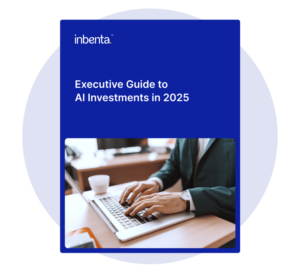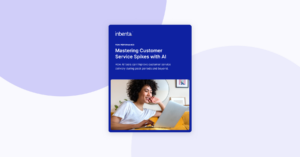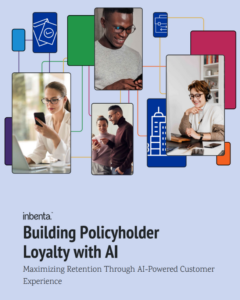As companies begin fully embracing AI, many are struggling with the state of their data, the challenge of integrating powerful new tools within their existing systems, and understanding how to measure their success. Inbenta CEO Melissa Solis recently explored these topics in a conversation with Inbenta strategic advisor and ex-TransUnion CEO, Bobby Mehta. The discussion covered common pitfalls and practical advice for businesses looking to implement AI effectively.
The following is an edited transcript of the conversation. Watch the full video below.
Where do companies stand today, and what are the primary challenges they face?
Bobby Mehta: We are likely nearing the end of the hype cycle, entering a phase of serious introspection, strategic thinking, and work to utilize AI’s potential at scale. AI and GenAI are now a top priority for most executives, with 75% listing them among their top three priorities. Most large enterprises are investing up to hundreds of millions of dollars to integrate AI. However, a gap exists between promise and impact. Only 26% of companies have successfully scaled AI initiatives to realize tangible value.
If your data is not AI-ready, you won't have success. Because if the information is wrong, the answer is going to be wrong." – Melissa Solis, Inbenta CEO
Melissa Solis: Many deployments are failing for various reasons. One reason: their data isn’t AI–ready. If your data is not AI–ready, you won’t have success. Because if the information is wrong, the answer is going to be wrong. There’s a myth that because people use ChatGPT, other solutions will work the same way. They don’t. While solutions advance, if data isn’t accessible, accurate, and intelligent, success is limited.
What lessons from previous transformations can inform a business’s AI strategy?
Melissa Solis: Leaders must avoid getting caught up in excitement. Instead, they need to make decisions based on the solid business principles they used to build and sustain their company. They have to look at the whole picture: does it speed things up? What are the consequences of not making solid decisions around compliance and governance? This requires walking through the same steps used for any good business decision.
Bobby Mehta: The challenges of AI deployment are similar to those faced in large-scale business re-engineering 40 years ago or initial moves to offshoring various functions. We have these playbooks from past transformations. We just need to pick them up and adapt them to the current situation. Basic principles like workforce readiness, clear messaging, and upskilling resources are consistent across technological shifts. That message is more credible if you’re an early starter, positioned to gain market share and accelerate organic growth. If you’re doing it reactively, you’re more likely to have layoffs. If you’re doing it proactively, you can grow into it and minimize negative aspects.
We have these playbooks from past transformations. We just need to pick them up and adapt them to the current situation." – Bobby Mehta, Inbenta Senior Advisor
How should businesses think about building vs buying AI?
Bobby Mehta: Enterprises can learn from modern software development. If something isn’t unique, better vendor partners likely exist; adapt their solutions to your needs. True competitive advantage comes from identifying unique processes — not just the AI, but leadership’s imagination: to reimagine work, automation, human judgment, and maximizing the value of data assets.
Melissa Solis: You can’t be the best at everything. Sometimes partnering with leaders makes sense; other times, building internally is needed for exact customization. Successful companies in this AI journey use a mixture of buy and build. Knowing your strengths and partnering with specialists is a great strategy for success.
What AI investments should businesses prioritize now?
Bobby Mehta: If I had to pick one AI investment to prioritize… I’ll give you two: contact centers and coding co-pilots. These are no-regrets moves.
Melissa Solis: Absolutely coding co-pilots. We use AI internally and partner with great vendors. I agree with Bobby; coding co-pilots are an amazing tool.
Bobby Mehta: Adding AI in contact centers (internal/external) is another no-regrets move, likely among the most deployed. Vendor partners often have broad experience deploying these.
Transform your customer experience with AI.
Inbenta’s Conversational AI platform is deployed by companies across industries around the globe to intelligently automate customer service, marketing and sales, and internal operations.












